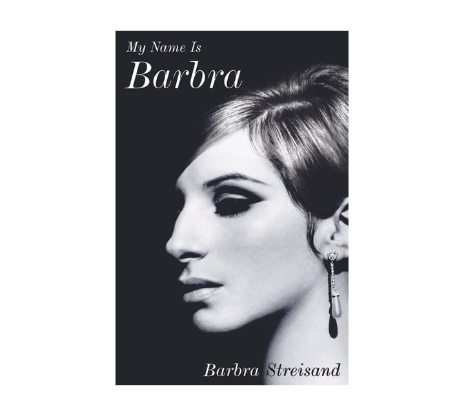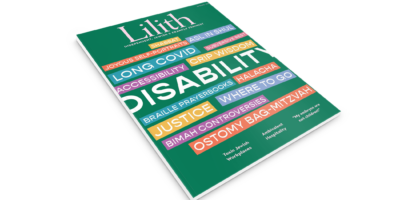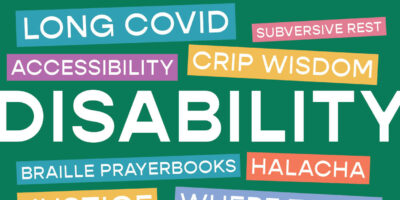
Brooklyn Babs Does It Her Way
Reading My Name is Barbra (Viking, $47.00), the long-awaited memoir from the superstar who needs no last name, is like having a (very) long chat with one of your besties. Its conversational tone reminds you on every page that this iconic director, actor, and singer is a profoundly human and humane powerhouse. Streisand writes that “when you’re a performer, the shadow you cast is much bigger than you, the actual person.” But in these pages, Babs the person casts quite a wonderful shadow and provides a lot of Jewish feminist light as well.
Barbra is and always has been a character from Brooklyn, passionate about her work. She still bears the scars of los- ing her father too young. And when she muses that “looking back, I feel as if I didn’t fulfill my potential. And now it’s too late,” we hear the remnants of a hypercritical mother who didn’t get to fulfill her own dreams.
The angst and insecurity that cause her to wonder still if people will show up for a concert also fueled her drive. One of the many delights of this book is that Babs both chronicles her perfectionist tendencies when it comes to her work and also repeatedly names the gendered double standard that lambasts her for being a control freak.
When Lawrence Grobel interviewed her for Playboy in 1977, she cannily reframed her supposed control issues as her sense of “artistic responsibility”: “If you mean that I am completely dedicated and care deeply about carrying out a total vision of a project … yes, that’s true.” That lifelong commitment to her vision caused her to argue successfully for the 2023 extended version of The Way We Were, which included previously deleted political scenes, and prompted her to recut parts of A Star is Born for Netflix in 2018.
Although Babs didn’t assume the role of director until Yentl (1988), she was always “thinking like a director.” Her early success in the Broadway play I Can Get It for You Wholesale was due to her talking back to the director, and her stint as a performer in night clubs gave her the opportunity to be in charge and put into action her own vision for a show. When negotiating her first record contract, she opted for creative control instead of more money.
She credits William Wyler, director of Funny Girl, for encouraging her own directorial sensibilities. While the rumor mill depicted her (not for the first or last time!) as trying to take over, he was secure enough not to be threatened by her input or her questions. He recognized and respected her ability to think about the entire film rather than just her own part. At the end of filming Funny Girl, he presented her with a director’s megaphone that bore her name, a gift that was both “prophetic and funny.”
Her directorial credits include Yentl, The Prince of Tides, and The Mirror Has Two Faces. The tales she tells about the making of these films are compelling and provide a bracing history of women directors in the film industry. On the set of Yentl, she had to deal with a snarky Mandy Patinkin (who played Avigdor), snarky because, she says, she wasn’t interested in the affair he assumed they were destined to have. She ended up rewrit- ing the script so there wouldn’t be a love scene between them: “I just couldn’t bear the thought of making love with him. I’m not that good an actress.” When Steven Spielberg was invited to a screening of Yentl, his only advice was “don’t change a frame.” Yet it was widely reported that he was a significant adviser on the film.
The boys’ club also reared its head on the set of The Prince of Tides. The all-male crew refused to stay late to finish a scene, and Nick Nolte, her co-star, backed them up. That night, he called to apologize, saying he “was too embarrassed to go against the guys.”
Despite such gaslighting and discrimination, Babs persisted. Thanks to Yentl, she was the first woman to win a Golden Globe for directing, a fact which fills her with pride—and rage at “how could they have ignored so many talented women” who came before her. While Yentl earned five Oscar nominations, best director wasn’t among them. Outside the ceremony, a women’s film group protested; proving once again that feminists have a wicked sense of humor, one protester carried a sign that read “Oscar, can you hear me” (an acerbic pun on “Papa Can You Hear Me,” a song from the film). And although The Prince of Tides garnered seven Oscar nominations, Streisand once again wasn’t nominated for best director. On the Oscar stage, Billy Crystal called out the Academy when he sang (to the tune of “Don’t Rain on My Parade”) “Seven nominations on the shelf, did this film direct itself?”
Just as Babs was always “thinking like a director,” she was also always think- ing about “the artist as citizen,” and as a Jew. She overcame her fear of performing live—yes, Babs famously suffers from stage fright—in order to benefit many progres- sive causes and candidates. Cognizant of the fact that “everyone in Hollywood was so afraid to be Jewish,” she refused to join the internalized antisemitism club. Instead, she insisted that Esther in A Star is Born be recast as a Jew, she sang Avinu Malkeinu when Israeli Prime Minister Shi- mon Peres turned 90, and “it’s a Jewish thing” became an inside joke between her and composer Marvin Hamlisch, as well as a refrain in this riveting memoir.
Babs doesn’t tell all in My Name is Barbra but she does tell a lot (after all, the memoir is almost 1,000 pages). In this sometimes poignant, sometimes enraging, often funny tome, we get to spend time with a flawed but truly fabulous Jewish feminist citizen-artist. When the book first came out, in November 2023, one Instagrammer quipped, “the 6th Book of Torah has arrived.” This reviewer would add, “And it is good.”
Helene Meyer is the author of Movie-Made Jews: An American Tradition.




